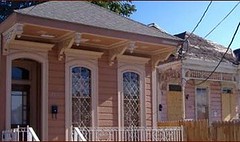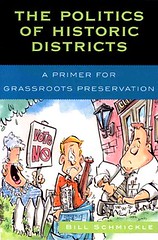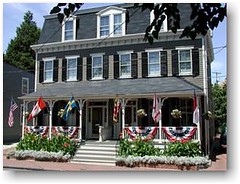Guest post: preservation (and environmental) advocates must consider the context of our advocacy

Posted May 15, 2009 at 1:38PM
Regular readers may remember that I believe both environmentalists and historic preservationists (I consider myself both) have a duty to articulate a positive vision in our advocacy. The days when it was acceptable to just say no, if they ever existed, are long gone, in my opinion. In particular, I believe we need to position ourselves as involved in shaping growth, not just opposing it, because opposition without affirmation can lead to more harm than good. (See my posts here, here, and here on environmentalism and neighborhood negativity, and here on preservation and credibility.)
This issue surfaced again recently, in an online conversation several of us were having as advisers to the website of the National Trust for Historic Preservation.  We were asked specifically to comment on a notice of a recent lawsuit filed by the Trust to block hospital construction in New Orleans until new sites were considered. While I have some confidence that the Trust considered all the pertinent issues and has positive alternatives in mind, it was not, in my opinion, possible to tell that from the web announcement.
We were asked specifically to comment on a notice of a recent lawsuit filed by the Trust to block hospital construction in New Orleans until new sites were considered. While I have some confidence that the Trust considered all the pertinent issues and has positive alternatives in mind, it was not, in my opinion, possible to tell that from the web announcement.
I said so, and one of my colleagues in the advisory group, Bill Schmickle, gave a particularly thoughtful response with a message that I thought more people should see. That prompted me to recruit Bill for this guest post. (By the way, you can easily substitute "environmental protection" for every mention of "preservation" in Bill's post, and it would still be valid, in my opinion.) The remainder is Bill's.
____________________________
Preservation has to be, simply because it is, only part of the warp and weft of a community. Some things are more important than preservation, and we sometimes tend to forget that. When we do, it puts the whole of preservation in doubt. Why? Because "advocacy" rests its expectation on shared values and reason, and when we insist on preservation values to the exclusion of others from the get-go, and try just to block projects and lawyer up, it makes us look insensitive, and to many folks that is seen as irrational. For them, everything else we contend for is just dropped into the same "well, what did you expect the Trust to say?" soup.
If there is one point at which the Trust and preservation lose the broader public it is in a general inability to communicate a sustaining vision for older communities that is forward looking and embraces change. Sometimes it seems that we take the position that preservation is our responsibility, and we'll contend for it, while others may contend on behalf of other interests.  So if we have better lawyers and better advocates, we can win. This interest group approach to politics is actually harder nosed than advocacy likes to admit, but it also misses what advocacy purportedly aims at: the common good based on shared values and reasoned discourse.
So if we have better lawyers and better advocates, we can win. This interest group approach to politics is actually harder nosed than advocacy likes to admit, but it also misses what advocacy purportedly aims at: the common good based on shared values and reasoned discourse.
Without a doubt, the Trust has to make sure that change occurs according to law and procedure. But lawyering up on technicalities will alienate more folks than it will persuade about the reasonableness of preservation.
When deciding on a policy position, we ought to think in two often incompatible ways: (1) We have to ask ourselves how well a policy choice comports with preservation precepts, and (2) We have to ask ourselves how that choice will affect the standing of preservation in the community.
A sustaining vision for a community, I think, depends on reshaping advocacy for maintaining the past into a vision for what I call "rooted growth." It seems to me that gives us a better chance of creating a consensus for preservation values in the midst of a community in conflict over how to retain and augment--and in New Orleans' case, recover--vitality in all those other interest sectors that have change at their core.
Perhaps the Trust, because it is THE Trust, tends to believe it has to stand for principle (sort of "if we don't, who will?") when push comes to shove and therefore must let others worry about the compromises and consequences. If that's the case, then the Trust will tend to yield the playing field to others.
It's rather like Quakers at the Quaker college where I used to teach politics. They believed that they simply had to be for iron clad principle to remind others of the immorality of war, for instance, and they relied on their Washington lobby, the American Friends Service Committee, to advocate their positions. Yet because of their principle-only approach, almost no one in DC security policy making ever gave them so much as a nod.
A British Quaker professor of war studies at King's College, London, once told me he decried the American Quakers' "prophetic" approach to politics. He said they acted from a vision of the way things ought to be, and insisted on policies that comported to that image.  British Quakers, on the other hand, tended to take policy disputes as largely others defined them and then advocated for those practical options that came closest to their preferred principles and also had the best likelihood of attaining desired consequences.
British Quakers, on the other hand, tended to take policy disputes as largely others defined them and then advocated for those practical options that came closest to their preferred principles and also had the best likelihood of attaining desired consequences.
"Growth" tends to define local options among competing groups. Preservationists always say they (we) aren't against growth. They have to say that to get a seat at the table. But they don't often know what to do with growth except to play gate-keeper. Even when they create historic districts to promote "good growth," in practice they tend to work to hobble it. That's why my next book aims at seeing how historic districts fare in their communities 20, 30, 40 years into their existence.
_______________________________
Bill Schmickle is the author of The Politics of Historic Districts: A Primer for Grassroots Preservation, a how-to guide for citizens. He is past chair of the Annapolis, Maryland Historic Preservation Commission, and was a cofounder of the Oak Ridge, North Carolina, Historic District. A former professor of political science, Bill now writes and consults on preservation issues. He and his wife, Charlotte, own and operate Flag House Inn in the Annapolis National Landmark Historic District.